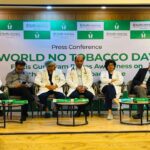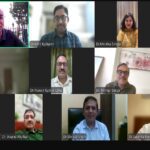“Concerted efforts needed to achieve targeted elimination of the disease by 2030”
New Delhi, June 28, 2018:
A recent research has found that the immune cells called natural killer (NK) cells may be used to develop future malaria vaccines. NK cells are found among people living in areas where the parasite is common. The team identified a molecule that was essential for activation of NK cells in response to malaria-infected blood cells. PfEMP1 is crucial for activating NK cells in a manner dependent on antibodies.
More than 90% of India’s population is at the risk of a malaria infection, as compared to Bangladesh at 11% and Nepal at 48%. According to the National Vector Borne Disease Control Programme, last year, there were 840, 838 cases of malaria in India, while 103 people died due to the disease.
Speaking about this, Padma Shri Awardee, Dr K K Aggarwal, President, Heart Care Foundation of India (HCFI), said, “India is a malaria endemic country. The reported malaria cases in the country last year have declined by 23% compared to 2016, yet India still accounts for 87% of malaria cases in the South Asia region. Also, as per the World Malaria Report, India has among the weakest malaria surveillance systems globally, with only 8% of cases detected by the surveillance system. Malaria is entirely a preventable disease. It is also a treatable disease provided it is diagnosed and treated in time. The symptoms of malaria are non-specific and can be variable. Thus, it may be mistaken for other diseases such as viral infections, typhoid and the diagnosis of malaria may be missed as a result.”
The WHO Global Technical Strategy for Malaria has set a target of reducing malaria case incidence by at least 90%, reducing malaria mortality rates by at least 90%, eliminating malaria in at least 35 countries and preventing a resurgence of malaria in all countries that are malaria-free.
Adding further, Dr Aggarwal, who is also the Vice President of CMAAO, said, “There is still a long road ahead before the goal of elimination of malaria throughout the country by 2030 is achieved. The ‘T3’ initiative of the WHO Global Malaria Program supports malaria-endemic countries in their efforts to achieve universal coverage with diagnostic testing and antimalarial treatment, as well as in strengthening their malaria surveillance systems T3 stands for Test. Treat. Track: every suspected malaria case should be tested; every confirmed case should be treated with a quality-assured antimalarial medicine; and the disease should be tracked through a timely and accurate surveillance system.”
Some tips from HCFI
- Malaria mosquitoes grow in fresh water collected in the house. It is therefore important to not let water stagnate in your house and the surrounding areas. Mosquito cycle takes 7-12 days to complete. So, if any utensil or container that stores water is cleaned properly once in a week, there are no chances of mosquito breeding.
- Mosquitoes can lay eggs in money plant pots or in water tanks on the terrace if they are not properly covered. If the water pots for birds kept on terraces are not cleaned every week, then mosquitoes can lay eggs in them.
- Using mosquito nets/repellents in the night may not prevent malaria because these mosquitoes bite during the day time.
- Malaria mosquitoes do not make a sound. Therefore, mosquitoes that do not produce a sound do not cause diseases.
- Wearing full sleeves shirt and trousers can prevent mosquito bites. Mosquito repellent can be helpful during the day.







